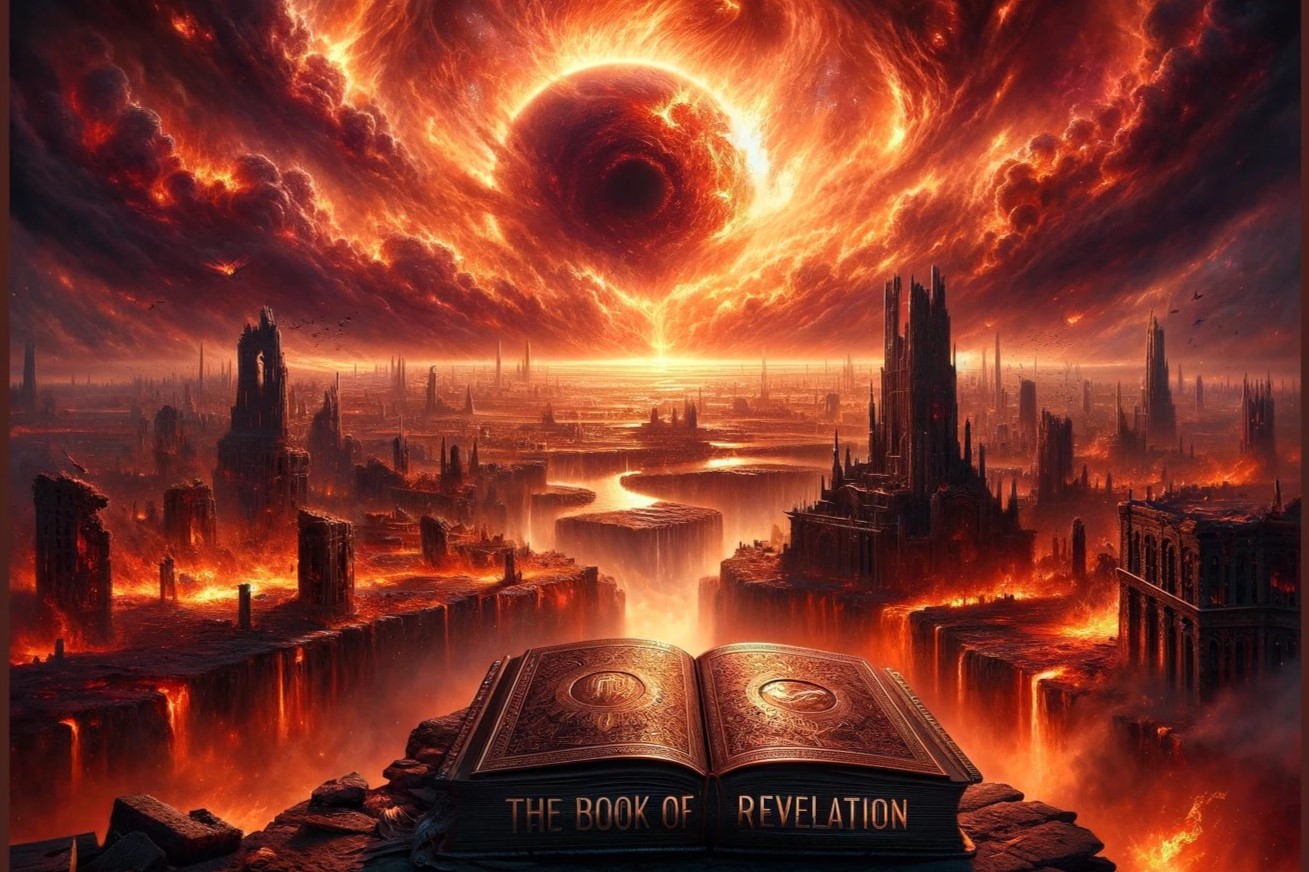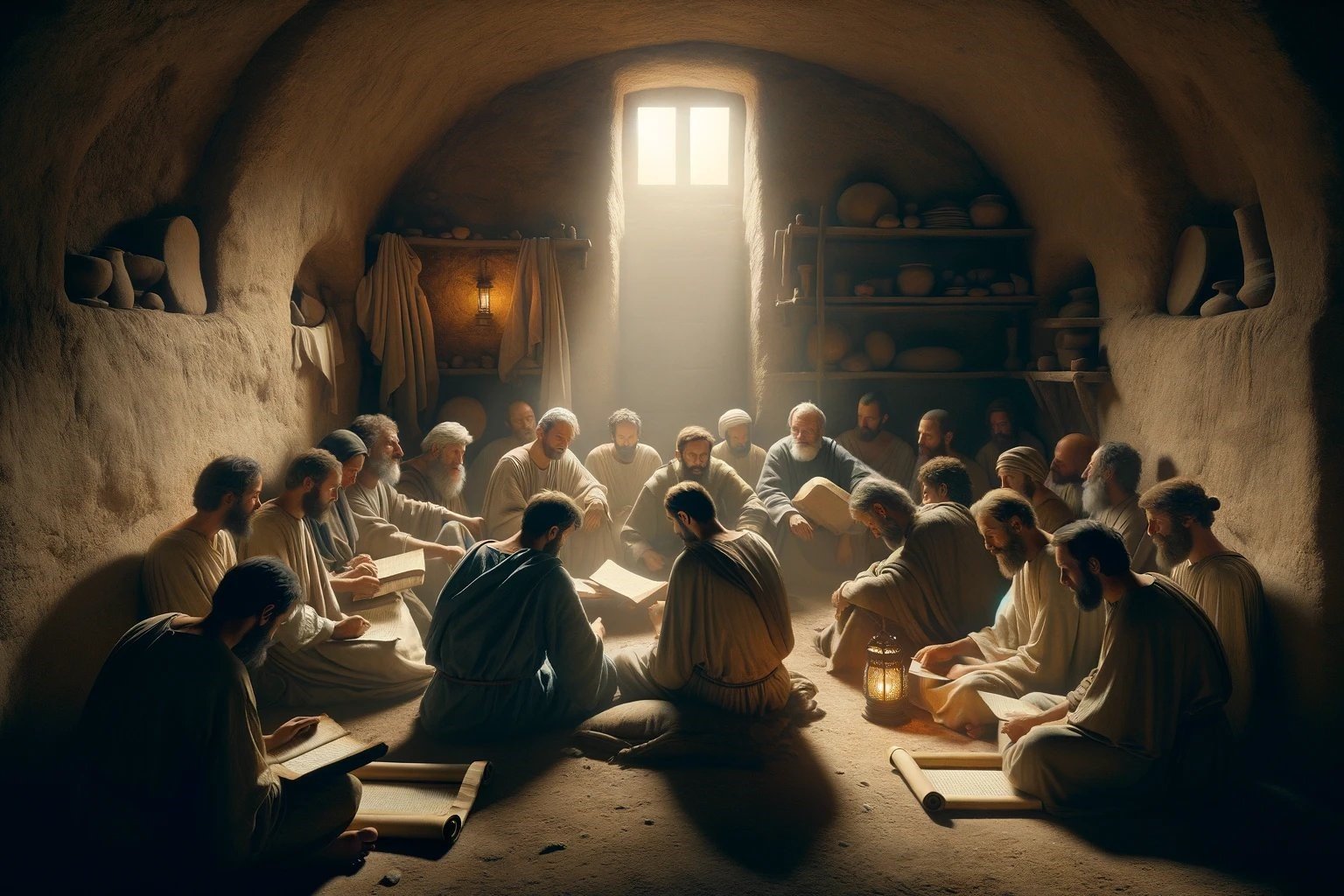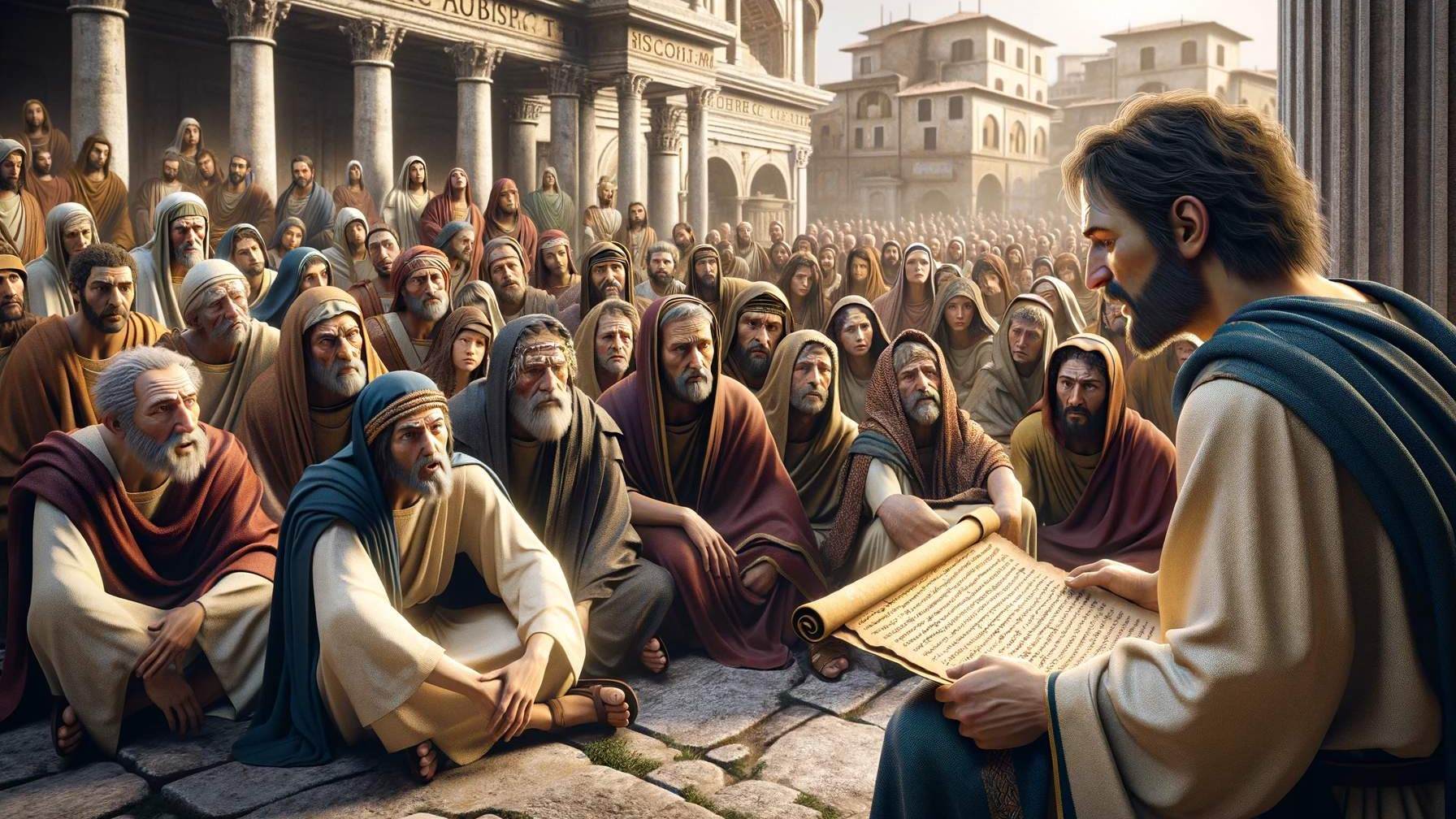Home>Bible Facts>Why Is Dan Not Mentioned In The Book Of Revelation


Bible Facts
Why Is Dan Not Mentioned In The Book Of Revelation
Published: February 11, 2024
Jason DeRose, Managing Editor at Christian.net, uses his expertise in religion and journalism to deepen understanding of faith's societal impacts. His editorial leadership, coupled with a strong academic background, enriches the platform’s diverse content, earning him recognition in both journalism and religious circles.
Discover the truth about Dan's absence in the Book of Revelation and explore fascinating Bible facts in this insightful article. Uncover the mystery now!
(Many of the links in this article redirect to a specific reviewed product. Your purchase of these products through affiliate links helps to generate commission for Christian.net, at no extra cost. Learn more)
Table of Contents
Introduction
The Book of Revelation, the final book of the New Testament, is a captivating and enigmatic text that has sparked countless discussions and interpretations throughout history. Among the twelve tribes of Israel, the tribe of Dan holds a significant place in the Old Testament. However, it is intriguing to note that this tribe is conspicuously absent from the list of tribes mentioned in the Book of Revelation.
The absence of Dan in the Book of Revelation has piqued the curiosity of scholars, theologians, and readers alike. This omission raises thought-provoking questions and invites a deeper exploration into the possible reasons behind this intriguing absence. Delving into this mystery not only sheds light on the historical and cultural significance of the tribe of Dan but also offers valuable insights into the complexities of biblical interpretation.
As we embark on this exploration, we will unravel the historical context of the tribe of Dan, examine the significance of the Book of Revelation, and consider the potential explanations for Dan's exclusion from the list of tribes in this prophetic book. By delving into these aspects, we aim to gain a deeper understanding of the intricate tapestry of biblical narratives and the profound implications of Dan's absence in the Book of Revelation.
The Absence of Dan in the Book of Revelation
The Book of Revelation, also known as the Apocalypse of John, is renowned for its vivid imagery, prophetic messages, and intricate symbolism. Within its pages, the apostle John receives divine revelations that unveil the culmination of human history and the ultimate triumph of good over evil. Central to the apocalyptic narrative is the enumeration of the twelve tribes of Israel, a symbolic representation of God's chosen people. However, amidst the listing of these tribes in Revelation 7, the absence of the tribe of Dan is striking and thought-provoking.
In Revelation 7:4-8, a detailed account is provided of the sealing of 144,000 individuals, 12,000 from each of the twelve tribes of Israel. The tribes are listed as Judah, Reuben, Gad, Asher, Naphtali, Manasseh, Simeon, Levi, Issachar, Zebulun, Joseph, and Benjamin. Notably, the tribe of Dan is conspicuously absent from this enumeration, deviating from the traditional order found in the Old Testament.
This omission has sparked considerable debate and speculation among scholars and theologians. The absence of Dan raises intriguing questions about the reasons behind this deviation from the established tribal listing. Various theories and interpretations have emerged in an attempt to unravel this enigma, with scholars delving into historical, textual, and theological analyses to discern the potential significance of Dan's exclusion.
The absence of Dan in the Book of Revelation has led to diverse interpretations, with some scholars proposing symbolic or theological explanations, while others explore historical and textual factors. This absence has also prompted reflection on the broader themes of tribal identity, divine election, and the intricate tapestry of biblical symbolism.
As we delve deeper into the mystery of Dan's absence in the Book of Revelation, it becomes evident that this enigmatic omission serves as a catalyst for profound contemplation and scholarly inquiry. By exploring the implications of this absence, we gain valuable insights into the intricate nuances of biblical interpretation and the enduring relevance of the Book of Revelation in shaping theological discourse and spiritual contemplation.
Possible Explanations for Dan's Exclusion
The absence of the tribe of Dan from the list of tribes in the Book of Revelation has spurred a wide array of interpretations and theories. Among the possible explanations for Dan's exclusion, one prominent line of thought revolves around the symbolic significance attributed to the tribe of Dan in biblical prophecy. Some scholars propose that Dan's absence may be linked to the tribe's historical and spiritual associations, leading to its omission from the apocalyptic enumeration.
Another perspective delves into the intricate symbolism embedded within the Book of Revelation. It is suggested that the omission of Dan may carry symbolic connotations, representing spiritual or theological themes within the apocalyptic narrative. This viewpoint underscores the symbolic nature of the tribes' enumeration, wherein each tribe may embody distinct spiritual attributes or prophetic symbolism. Consequently, Dan's absence could be interpreted as a deliberate theological motif, conveying profound spiritual implications within the apocalyptic framework.
Furthermore, historical factors are also considered in exploring the absence of Dan. Some scholars delve into the historical context of the tribe of Dan, examining its migrations, settlements, and interactions within ancient Israel. This historical lens offers insights into the unique trajectory of the tribe of Dan, shedding light on potential factors that may have influenced its portrayal in the Book of Revelation.
Textual analysis forms another crucial dimension in unraveling the mystery of Dan's exclusion. Scholars scrutinize the textual nuances of the Book of Revelation, seeking to discern any underlying textual, linguistic, or compositional factors that may have contributed to Dan's absence. This meticulous examination of the biblical text aims to uncover potential textual intricacies that could offer insights into the rationale behind the omission of Dan from the tribal enumeration.
Moreover, theological considerations are integral to the exploration of Dan's exclusion. Theological interpretations delve into the broader theological themes and motifs present in the Book of Revelation, seeking to discern the theological significance of Dan's absence within the prophetic framework. This theological inquiry encompasses diverse theological perspectives, including divine election, covenantal symbolism, and eschatological themes, offering a rich tapestry of theological insights into the enigmatic absence of Dan.
As we navigate through these potential explanations, it becomes evident that the absence of Dan in the Book of Revelation encompasses a multifaceted tapestry of historical, textual, theological, and symbolic dimensions. The convergence of these diverse perspectives invites profound contemplation and scholarly inquiry, underscoring the enduring enigma surrounding Dan's exclusion and its implications within the rich tapestry of biblical prophecy.
The Tribe of Dan in Old Testament Prophecy
The tribe of Dan occupies a significant place in Old Testament prophecy, with its historical and spiritual legacy intertwined with profound biblical narratives and prophetic symbolism. In the Old Testament, the tribe of Dan is depicted as one of the twelve tribes of Israel, tracing its lineage back to Dan, the son of Jacob and Bilhah, Rachel's maidservant. The tribe of Dan played a pivotal role in the intricate tapestry of Israelite history, contributing to the rich mosaic of tribal traditions and spiritual heritage.
One of the most notable references to the tribe of Dan in Old Testament prophecy is found in the blessings pronounced by Jacob upon his sons in Genesis 49. Within this prophetic oracle, Jacob bestows a distinctive blessing upon Dan, portraying the tribe as a "serpent by the roadside, a viper along the path" (Genesis 49:17). This enigmatic imagery encapsulates the unique prophetic destiny ascribed to the tribe of Dan, evoking contemplation on its spiritual significance and historical trajectory.
The territorial inheritance of the tribe of Dan is also delineated in the Old Testament, reflecting its geographical prominence within the land of Israel. The allotment of land to the tribe of Dan is detailed in Joshua 19, underscoring the tribe's territorial legacy and its integral role in the ancient landscape of Israel. This geographical dimension further accentuates the historical and prophetic significance of the tribe of Dan within the Old Testament narrative.
Moreover, the tribe of Dan is intricately woven into the fabric of Old Testament history, with its migrations, settlements, and interactions shaping the tapestry of Israelite heritage. The narrative of the Danites' migration to the northern region of Israel, where they established the city of Dan, underscores the tribe's dynamic historical trajectory and its enduring impact on the cultural and spiritual landscape of ancient Israel.
In the prophetic visions of Ezekiel, the tribe of Dan is symbolically represented in the intricate imagery of the visionary temple, signifying its enduring spiritual legacy within the prophetic tapestry of the Old Testament. This prophetic portrayal underscores the enduring significance of the tribe of Dan within the prophetic visions of Ezekiel, encapsulating its enduring spiritual legacy and prophetic symbolism.
The intricate interplay of historical, geographical, and prophetic dimensions illuminates the profound significance of the tribe of Dan in Old Testament prophecy, underscoring its enduring legacy within the rich tapestry of biblical narratives and prophetic symbolism. The tribe of Dan's portrayal in Old Testament prophecy serves as a testament to its enduring spiritual and historical significance, inviting contemplation on its profound legacy within the intricate tapestry of biblical prophecy and Israelite heritage.
Conclusion
The absence of the tribe of Dan in the Book of Revelation presents a compelling enigma that has captivated the attention of scholars, theologians, and readers. This absence, amidst the enumeration of the twelve tribes of Israel in the apocalyptic narrative, has sparked diverse interpretations and inquiries, inviting profound contemplation on the potential reasons behind this intriguing omission. As we have delved into this thought-provoking mystery, exploring the historical, textual, theological, and symbolic dimensions, a rich tapestry of insights has emerged, shedding light on the enduring significance of Dan's absence within the prophetic framework of the Book of Revelation.
The multifaceted exploration of possible explanations for Dan's exclusion has underscored the intricate interplay of historical, textual, and theological factors that contribute to the enigmatic absence of this tribe. From the symbolic significance attributed to the tribe of Dan in biblical prophecy to the theological motifs embedded within the Book of Revelation, each perspective offers valuable insights into the profound implications of Dan's absence. The historical and geographical dimensions of the tribe of Dan, intertwined with its prophetic legacy, further enrich our understanding of its enduring significance within the Old Testament narrative.
Moreover, the absence of Dan in the Book of Revelation serves as a catalyst for profound contemplation on the complexities of biblical interpretation, the enduring relevance of apocalyptic symbolism, and the intricate tapestry of Israelite heritage. This absence invites us to delve into the depths of biblical prophecy, theological symbolism, and historical intricacies, fostering a deeper appreciation for the enigmatic nuances that permeate the Book of Revelation.
As we conclude this exploration, it becomes evident that the absence of Dan in the Book of Revelation transcends mere omission, offering a profound tapestry of historical, textual, and theological dimensions that invite contemplation and scholarly inquiry. This enduring enigma serves as a testament to the enduring relevance of biblical narratives, the complexities of prophetic symbolism, and the timeless allure of enigmatic mysteries within the sacred texts. In unraveling the enigma of Dan's absence, we embark on a journey of profound discovery, delving into the depths of biblical prophecy and spiritual contemplation, and embracing the enduring legacy of the tribe of Dan within the rich tapestry of biblical heritage.















